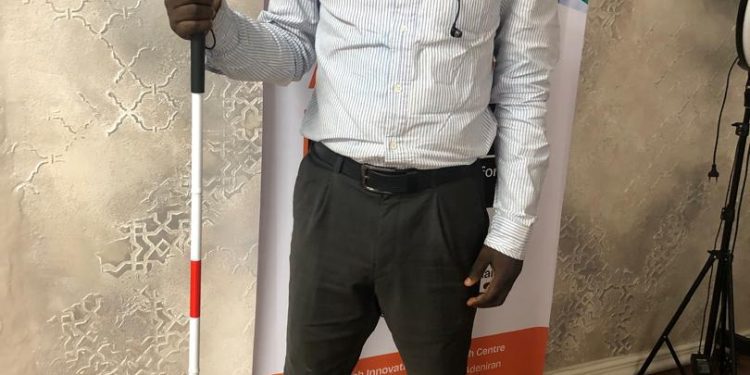Emmanuel Adeyemi Oladipo is a child development trainer and a person with disability. He is an empathic leader and dynamic communicator, he emphasizes problem-solving that centers on people-focused solutions. In this interview, he shares his experience as a person with visual impairment in Nigeria. Excerpts below;
Question: Can you please introduce yourself?
Response: My name is Emmanuel Adeyemi Oladipo and I am a child development trainer with Children Evangelism Ministry International and a people-oriented personality. I address myself as an empathic leader and a dynamic communicator driving values through peoples focused solution. I have a background in communications as I have a degree in Mass Communications from the university of Lagos. Despite my visual impairment, I have scaled through hurdles, surmounted challenges and am currently impacting children and adults alike.
Question: How has it been as a person with disability?
Response: It has been fun and challenging. The fun part of it is I get to seek and discover other ways to achieve what I want to do as being visually impaired has taught me that not everything you want to do requires your sight. Other sense organs can be developed and used efficiently as well as the mind being accustomed to some things. The challenging part of it could be that there are certain things that cannot be done without sight which would require depending on others to get it done or assisting one in doing it.
Question: Are there others with visual impairment in your family?
Response: I am the only one with visual impairment and I am the first of five children. Contrary to what people think that disability can be contracted, it is not a communicable disease.
Question: How do you handle moving around independently?
Response: The first thing I did was to understand my personal environment through the help of people around me so that I can move around independently especially in my apartment and also other nearby places to me like the bookshop, the supermarket, etc This is the easy part but the challenging part is moving from home to work, or home to church or other places which would require me depending on people along the way in crossing, entering the right bus and also knowing particularly the street I am going has helped me a lot in my daily commuting.
Question: How has this disability affected you as a person?
Response: At first, it always looks like a roadblock but there is always a way out. My mother played a huge role in this by making sure I used my other sense organs and trained me on how to respond to situations, how to eat properly and also educate and train me. I learnt how to do a lot of things, got skills that is currently my earning power, learning to be friendly and not necessarily reserved due to the impairment which makes me have a lot of friends. Blindness is not an excuse to not be friendly or interact properly with people, education brings a lot of enlightenment. All hope is not lost as long as you are ready to open your mind to learning.
Question: How supportive has your family been?
Response: My family has been very supportive and we all relate very normally and you would not even know I am visually impaired. They empowered me to be able to earn for myself which I do currently and also still try to help me if I have other basic needs. They are very supportive and helpful and have contributed largely to my life. I am thankful to have them.
Question: What would you have loved your parents to do differently in managing the situation?
Response: I would have loved to learn how to cook, I was taught every other thing except cooking which makes me dependent on either the help to cook for me or eat out. I am honestly still very open to learning and hope to find a patient person who would be willing to at least teach me how to light a gas.
Question: What would be your advice to the government to help individuals with disability?
Response: The government is trying their best currently as they have left 5% of employment open to people with disability which has helped in a way however, this needs to move from legislative policies to implementation and proper monitoring would help produce effectiveness amongst these organizations. Another thing that has to be worked on is the roads, the roads are not very walkable for a visually impaired person which usually leads to falls, injuries and some fatal wounds. Enforcement helps improve the quality of bills that have been passed.
Question: Final words
Response: Blindness is not darkness, put your other senses to work and so there should be no stigma around it. The society was not built for us but the government is trying to incorporate us into the system. We also should be open to it and be skilful. Learn skills that can make you employable and useful in the workplace and industry.
This exclusive interview was conducted by Adebola Subair, a Masters Student of Mass Communication at the University of Lagos, as part of a training on Disability Reporting facilitated by Blessing Oladunjoye, Publisher of BONews Service.

